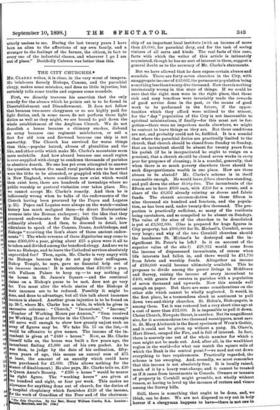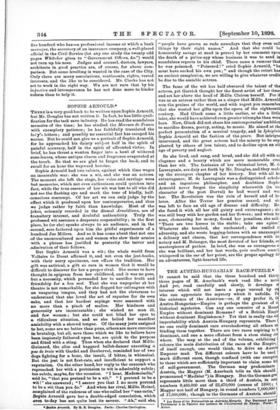THE CITY CHURCHES.* 31n. CLARKE writes, it is clear, in
the very worst of tempers. He belabours fiercely Bishops, Canons, and the parochial clergy, makes some mistakes, and does no little injustice, but certainly tells some truths and exposes some scandals.
First, we directly traverse his assertion that the only remedy for the abuses which he points out is to be found in Disestablishment and Disendowment. It does not follow that because two-score clergymen or so are highly paid for light duties, and, in some cases, do not perform these light duties as well as they might, we are bound to pull down the whole establishment of the Anglican Church. We do not demolish a house because a chimney smokes, disband an army because one regiment misbehaves, or sell a fleet for old iron and firewood because one ship is not seaworthy. The Church has survived far worse things than this,—popular hatred, abuses of pluralities and the like, and other evils which make Mr. Clarke's mountains seem mere molehills. And how absurd because one small region is over-supplied with clergy to condemn thousands of parishes to absolute dearth. No one has yet even attempted to answer the question whence the small rural parishes are to be served were the tithe to be alienated, or grappled with the fact that in New England, where conditions now exist which would then exist here, there are hundreds of townships where no public worship or pastoral visitation ever takes place. No; we cannot accept Mr. Clarke's remedy. And then he is ludicrously wrong when he talks of the endowments of the Church having been procured by the Popes and Legates (p. 35). Popes and Legates were always on the watch—unless history has much maligned them—to divert Ecclesiastical revenue into the Roman exchequer ; but the idea that they procured endowments for the English Church is extra- ordinarily absurd. And then, to descend to detail, how ridiculous to speak of the Canons, Deans, Archbishops, and Bishops "receiving the lion's share of these ancient endow- ments"! The whole revenue of these dignitaries may come to some £300,000 a year, giving about 225 a piece were it all to be taken and divided among the beneficed clergy. And are we to have no Bishops, and to leave the Cathedral services absolutely unprovided for? Then, again, Mr. Clarke is very angry with the Bishops because they do not pay their suffragans. Bishop Temple, he says, gave no financial help out of his immense income ! It is notorious that 210,000 a year, with Fulham Palace to keep up — to say nothing of the house in St. James's Square —and the continual claims on a Bishop's purse to be met, does not go very far. You must alter the whole status of the Bishops if their incomes are to be reduced. Possibly it might be done, and done to advantage, but all this talk about immense incomes is absurd. Another gross injustice is to be found on Pp. 26-7, where Mr. Clarke has a table, in which he gives in successive columns : "Church," "Incumbent," "Income," "Number of Working Hours per Annum," "Sum received Per Working Hour at Service in the Church." One example will serve well enough to show how grossly unjust such an array of figures may be. We take No. 15 on the list,—it would be offensive to give names. The income of the in- cumbent is given at "440 ± house." Now, as Mr. Clarke himself tells us, the house was built a few years ago, the incumbent finding £1,000 out of his own pocket. As he vas then, to judge by the date of his ordination, fifty- *even years of age, this means an annual sum of £75 at least, the amount of an annuity which could have been purchased for 21,000. (This allows nothing for the shame of disablement.) He also pays, Mr. Clarke tells us, £30 to Queen Anne's Bounty. "£330 + house" would be nearer the right figure. The "working hours" are given at two hundred and eight, or four per week. This makes no allowance for anything done out of church, for the duties of a. hospital chaplaincy which furnishes £120 of the income,
lor the work of Guardian of the Poor and of the chairman- es -
ii:Ths GUY Churchesd . By the Rev. Henry William Clarke, B.A. London : 'Pkba. Marshall, an 0o. El5iall
I a [y at he
3,
ae .ia a
OT
cc in ae
5- se as ,in ha
at is ad
th so in hr
:el lu atl re !el
ship of an important local institute (with an income of more than £8,000), for parochial duty, and for the task of seeing visitors of all sorts and kinds. The real facts of this case, facts with which the writer of this article is intimately acquainted, though he has no sort of interest in them, suggest a general doubt as to the accuracy of Mr. Clarke's statements.
But we have allowed that he does expose certain abuses and scandals. There are forty-seven churches in the City, with an aggregate income of £43,662, the permanent pop ulation being something less thantwenty-five thousand. Now there is nothing intrinsically wrong in this state of things. If we could be sure that the right men were in the right place, that these rich and easy benefices were invariably made the rewards of good service done in the past, or the means of good work to be performed in the future, if the oppor- tunities which they afford were utilised to the utmost, for the " day" population of the City is not inaccessible to spiritual ministrations, if finally—for this must not be for- gotten—there were no imperious needs elsewhere, we might be content to leave things as they are. But these conditions are not, and probably could not be, fulfilled. It is a scandal that where the parochial duties are practically limited to the church, that church should be closed from Sunday to Sunday, that an incumbent should be absent for twenty years from his parish (if he is incapacitated he ought to resign on a pension), that a church should be closed seven weeks in every year for purposes of cleaning; it is a scandal, generally, that when there is so much poverty elsewhere there should be such disproportionate wealth in one place. How are these abuses to be abated ? Mr. Clarke's scheme is in itself reasonable enough. He would leave fifteen churches standing, and pull down the other thirty-two. The incumbents of the fifteen are to have 2800 each, with £250 for a curate, and a share of the £6,852 already existing as domus and fabric funds. The church accommodation in these fifteen is nine thousand six hundred and fourteen, and the popula- tion, as has been said, under twenty-five thousand. The pro- portion is practically sufficient, so many of the residents being caretakers, and so compelled to be absent on Sundays. The value of the sites of the churches to be demolished is put at 23,502,000. (One is prepared for huge figures in City property, but £800,000 for St. Michael's, Cornhill, seems very large ; and why of the two Cornhill churches should the handsome St. Michael's be destroyed and the in- significant St. Peter's be left ? Is it on account of the superior value of the site ?) 228,812 would come from the income of dispossessed incumbents, of course when life interests had fallen in, and there would be £11,736 from fabric and worship funds. Altogether an income of £180,000 would become ultimately available. This he proposes to divide among the poorer livings in Middlesex and Surrey, raising the income of every incumbent to £400, with grants for curates in parishes with a population of seven thousand and upwards. Now this sounds well enough on paper. But there are some considerations on the other side which cannot be wholly neglected. It would, in the first place, be a tremendous shock to sentiment to pull, down two-and-thirty churches. St. Helen's, Bishopsgate, is among them. Yet it was restored but a very short time ago at a coat of more than £12,000. It is impossible to pull it down. Christ Church, Newgate Street, is another. But its magnificent size, for it accommodates two thousand worshippers, must save it. St. Mary Abchurch is the finest specimen of Wren's Gothic, and it could not be given up without a pang. St. Olave's, Hart Street, escaped the Fire, and is full of interest. In fact, there is scarcely one out of the whole number for which a case might not be made out. And, after all, in the wealthiest region in the world—for what can match the square mile of which the Bank is the central point ?—we need not cut down everything to bare requirements. Practically regarded, the scheme is too sweeping. And, secondly, we must remembes that this income is not absolutely free. It is locally raised, much of it by a heavy rent-charge, and it cannot be treated as if it came from investments in Consols. Owners or tenants of property in Cornhill might grumble, not wholly without reason, at having to level up the incomes of rectors and vicare among the Surrey hills.
Still, there is something that ought to be done, and, we think, can be done. We are not disposed to cry out in holy horror if a clergyman happens to have—there is not one in
five hundred who has—a professional income at which a bank manager, the secretary of an insurance company, a well-placed official in the Civil Service (let any one study the twenty odd pages Whitaker gives to "Government Offices, &c.") would not turn up his nose. Judges and counsel, doctors, lawyers, architects in good practice are, of course, far above com- parison. But some levelling is wanted in the case of the City. Only there are many associations, sentiments, rights, vested interests, and the like to be considered. Mr. Clarke has not set to work in the right way. We are not sure that by his injustice and intemperance he has not done more to hinder reform than to help it.



































 Previous page
Previous page